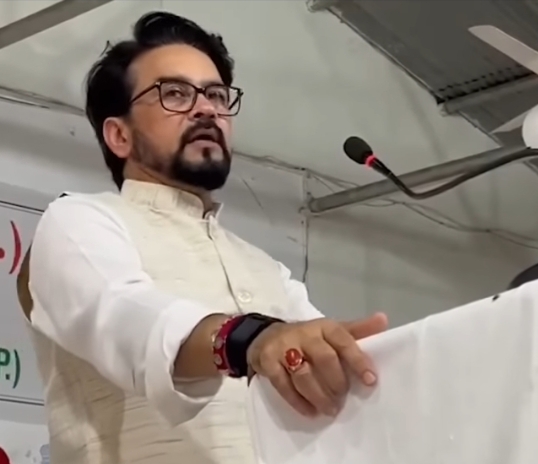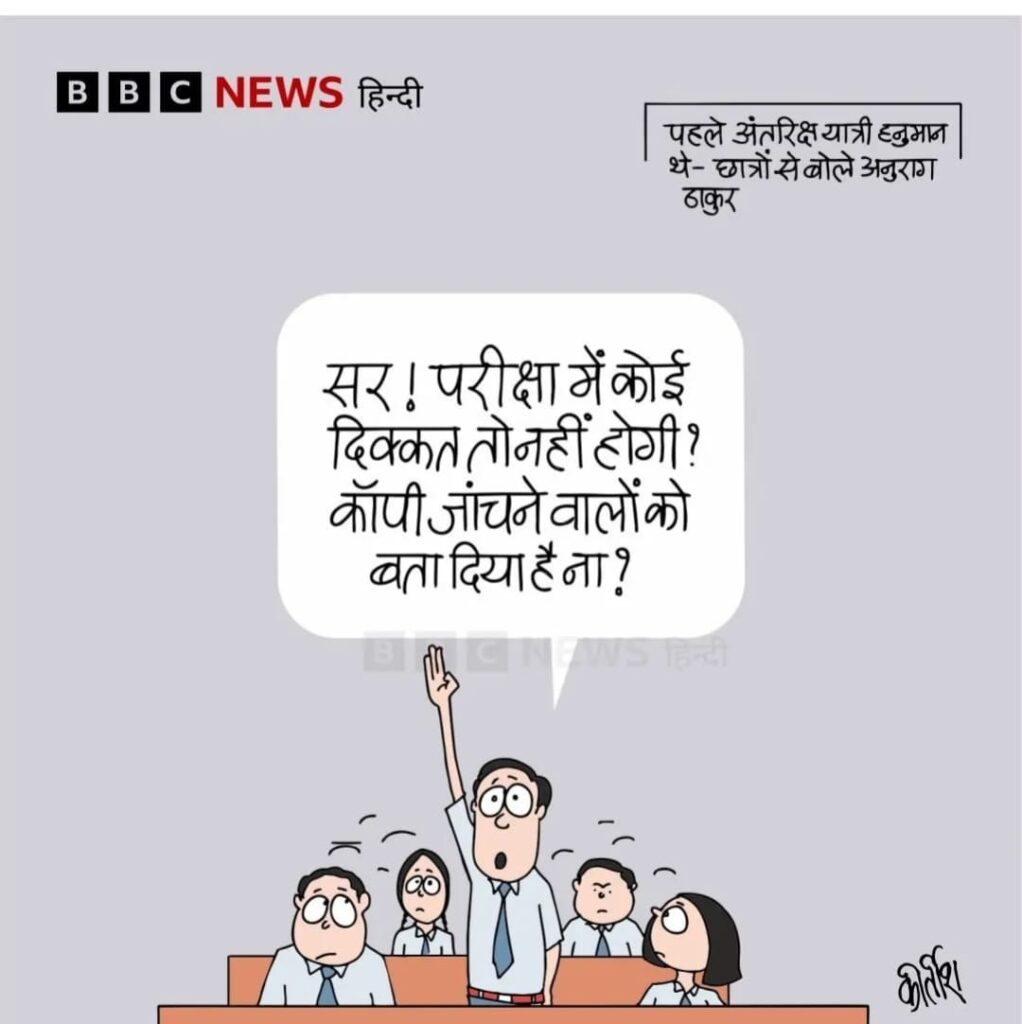


Myth Over Matter: India’s Alarming Slide from Science to Superstition
In a nation once hailed for its commitment to rational inquiry and scientific progress, a disturbing trend has taken root. Over the past few decades, the right-wing ecosystem, spearheaded by the Bhartiya Janata Party (BJP) and its ideological allies, has systematically eroded India’s scientific temper. This assault, often cloaked in cultural pride and nationalist fervour, substitutes mythological narratives for empirical facts, risking the intellectual future of generations. The latest episode involving BJP MP Anurag Thakur exemplifies this perilous shift, where folklore trumps history in the classroom.
A Space Oddity: Thakur’s Hanuman Claim Sparks Outrage
On August 23, 2025—coinciding with National Space Day—former Union Minister and BJP MP Anurag Thakur addressed students at Jawahar Navodaya Vidyalaya in Una, Himachal Pradesh. Posing a seemingly straightforward question: “Who was the first person to travel to space?” The students, drawing from their textbooks, responded “Neil Armstrong.” Thakur, however, dismissed this with a smile, asserting, “I think Hanuman Ji was the first to travel to space.” He referenced the Ramayana, where the child Hanuman leaps towards the sun, mistaking it for a fruit. Urging educators to “come out of the textbooks,” Thakur implied that ancient myths hold superior wisdom to modern science.
This wasn’t just a casual remark; it was delivered at a school event meant to celebrate India’s space achievements, like the Chandrayaan missions. Ironically, the students’ answer was partially incorrect— the first human in space was Soviet cosmonaut Yuri Gagarin in 1961, while Armstrong was the first on the Moon in 1969. Instead of correcting them with facts, Thakur opted for mythology, drawing sharp criticism from opposition leaders.
Tamil Nadu Chief Minister MK Stalin, echoing his party’s rationalist roots, reiterated that “only educational facts should be taught to students,” warning against conflating science with superstition. DMK spokesperson TKS Elangovan added, “Science is not mythology,” highlighting the risk of corrupting young minds.
Social media erupted in backlash, with users mocking the claim and questioning Thakur’s credentials.
One social media post quipped, “Maybe Anurag Thakur went with Hanuman Ji,” underscoring the absurdity. This incident isn’t isolated; it’s symptomatic of a broader pattern where right-wing figures weaponize myths to foster a pseudo-nationalist identity.
From Nehru’s ‘Scientific Temper’ to the Prevailing ‘Mythological Narrative’ That is Used for Political Purposes and Endangering the Young Generation
India’s founding fathers envisioned a republic grounded in reason. Jawaharlal Nehru, in his Discovery of India, championed “scientific temper” as essential for progress, embedding it in the Constitution under Article 51A as a fundamental duty. Post-independence, institutions like the Indian Space Research Organisation (ISRO) and the Council of Scientific and Industrial Research (CSIR) embodied this ethos, propelling India from famine-prone to a space-faring nation.
Yet, over the past few decades, particularly under BJP-led governments since 2014, this foundation has crumbled.
From Nehru’s ‘scientific temper’ to the prevailing ‘mythological narrative’ that is used for political purposes and endangering the young generation, the shift is stark. Prime Minister Narendra Modi himself set the tone in 2014, claiming at a Mumbai hospital event that Lord Ganesha’s elephant head was evidence of ancient plastic surgery, and Karna from the Mahabharata as proof of genetic science. Such statements, amplified by the Rashtriya Swayamsevak Sangh (RSS)—the BJP’s ideological parent—blend Hindutva with pseudoscience, portraying ancient India as a technological utopia.
This narrative serves political ends: it bolsters cultural supremacy, diverts from real issues like unemployment and inequality, and consolidates voter bases through emotive appeals.
Critics argue it’s a deliberate erosion, with over 100 scientists in 2024 accusing the Modi government of an “antagonistic stance” to evidence-based thinking. As one report notes, leaders are “making unscientific claims of imaginary technological achievements” rooted in exaggerated ancient knowledge.
Curriculum Overhaul: Purging Science for Ideology
The assault extends to education.
The National Education Policy (NEP) 2020, while promising reforms, has been criticized for promoting “Indian Knowledge Systems” that equate Vedic myths with science. In 2023, the National Council of Educational Research and Training (NCERT) removed chapters on Darwin’s evolution theory and the periodic table from Class 10 textbooks, sparking protests from hundreds of scientists who decried it as a blow to rational education. Topics on democracy, secularism, and Mughal history were also excised, replaced with content emphasizing Hindu epics.
In BJP-ruled states, the trend is more pronounced. Karnataka under BJP introduced “religious, political, and mythological” content, later purged by the Congress government in 2017. Uttar Pradesh and Gujarat have integrated stories of ancient “vimanas” (flying machines) into syllabi, claiming they predate the Wright brothers. At the Indian Science Congress—once a bastion of research—the event has devolved into a platform for outlandish claims.
In 2019, speakers dismissed Einstein’s theories, suggesting ancient Indians invented airplanes and stem cell technology, even proposing to rename gravitational waves after Modi.
Funding cuts to the Congress in 2024 further signal disdain for independent science.
This ideological tinkering undermines critical thinking. As Satyajit Rath of the Indian Institute of Science Education and Research noted, under right-wing rule, scientific temper is being eroded through “majoritarian nationalism.”
The result?
A generation confused between fact and fiction, ill-equipped for a tech-driven world.
Political Patronage: From Pseudoscience to Peril
The right-wing ecosystem’s embrace of pseudoscience isn’t benign; it’s dangerous. RSS affiliates like the Vijnana Bharati promote “Vedic science,” claiming cures for diseases through cow urine or astrology. During the COVID-19 pandemic, some BJP leaders endorsed unproven remedies like “coronil” by Patanjali, delaying vaccine acceptance. This “creeping spread of pseudoscience,” as Chemistry World reported in 2017, worries scientists who fear government complicity.
Dissenters face backlash.
Rationalists like Narendra Dabholkar and Gauri Lankesh were murdered for challenging superstitions, with links to right-wing groups. Over 150 scientists in 2019 urged voters to reject divisive politics that lynch or discriminate, linking it to anti-science attitudes.
The nexus between politics, religion, and violence makes science communication “life-threatening,” per a Sage Journals study.
Endangering the Youth: A Generational Betrayal
The real victims are India’s youth. In a country where 65% of the population is under 35, fostering unscientific narratives hampers innovation. ISRO’s successes rely on rigorous science, not myths. Yet, events like Thakur’s dilute this, promoting blind faith over inquiry. As one analysis warns, this “slow death of scientific temper” in education will stifle progress. Globally competitive nations prioritize STEM; India risks falling behind if mythology supplants math.
Stalin’s stance in Tamil Nadu, rooted in Dravidian rationalism, offers a counterpoint. His government resists NEP’s ideological elements, emphasizing facts. Nationwide, educators and experts must be invited to schools, not politicians peddling baseless claims.
Reclaiming Reason: A Call to Safeguard India’s Future
India’s descent from Nehru’s enlightenment to Modi’s mythological mirage demands urgent reversal. Civil society, scientists, and opposition must amplify voices for reason. Reinstate purged curricula, fund independent research, and prosecute pseudoscience promoters. Only then can India honor its constitutional duty to scientific temper, ensuring the young generation inherits a legacy of progress, not peril.
Hasnain Naqvi is a former member of the history faculty at St. Xavier’s College, Mumbai.





